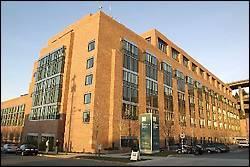| The Hutch is a major player in cancer care and research
 |
| Harley Soltes / The Seattle Times |
| In the 1990s, The Fred Hutchinson Cancer Research Center moved to a new campus at South Lake Union, 1100 Fairview Ave N., which it built for more than $150 million. |
THE FRED HUTCHINSON Cancer Research Center in Seattle has saved thousands of lives in its 25 years of existence.
The Hutch performs about 450 bone-marrow and stem-cell transplants a year on patients whose cancers were once thought to be incurable.
It is the largest bone-marrow-transplant center in the world, and, in the words of leukemia experts such as Dr. Richard Shadduck of Pittsburgh, it is "the Mecca."
"Everyone would agree the Seattle program took off not only numerically but scientifically and blazed trails in the field," he said.
The taxpayers have helped: The Hutch leads the nation in funding from the National Cancer Institute (NCI) - a notable achievement for a place specializing in blood cancers, which account for just 10 percent of the new cancer cases in the United States each year.
The Hutch received $69 million from the NCI in fiscal 1999 (the latest figures available) - more than Johns Hopkins, Sloan-Kettering, M.D. Anderson or any other well-known cancer center.
In all, The Hutch got $142 million in 2000 - about two-thirds of its total revenue - from the federal government. Of the remainder, about $40 million comes from patient fees, $25 million from direct public support and $12 million from other sources.
Fred Hutchinson
Cancer Research Center


Established: 1975
Employees: 2,300
Volunteers: 1,400
Clinical Research Division
staff: 943
Budget: $204 million
National Institutes of
Health grants (2000):
$142 million |
|
 |
The center is named for a former major-league baseball player and manager from Seattle who died of cancer in 1964. Fred Hutchinson's brother, Bill, a Seattle surgeon, knew U.S. Sen. Warren Magnuson of Washington, the longtime chairman of the Senate Appropriations Committee. Magnuson pushed through a $5 million grant, and The Hutch was on its way, opening in 1975.
It is one of 38 federally designated Comprehensive Cancer Centers in the United States and the only one in the Northwest.
Over the years, The Hutch has spawned seven major biotechnology companies, including Immunex and Cell Therapeutics, making Seattle the nation's fifth-largest biotech center by employment.
In the 1990s, The Hutch built a new campus at Seattle's South Lake Union for more than $150 million.
In 1998, The Hutch, Children's Hospital & Regional Medical Center and the University of Washington formed the Seattle Cancer Care Alliance, described as "the new front door to comprehensive oncology services in the Pacific Northwest." The alliance's seven-story outpatient clinic was built next door to The Hutch.
The Hutch is also becoming a leading center for stem-cell transplants, a safer procedure in which immature cells that give rise to other blood cells are used instead of bone marrow to rebuild the body's immune system after massive chemotherapy and radiation.
The procedure left two-thirds of patients cancer-free after two years, compared with 45 percent of bone-marrow patients, according to a Hutch study recently published in The New England Journal of Medicine.
Dr. William Bensinger, director of the study, said stem-cell transplants could help thousands of patients worldwide who are treated for blood cancers, especially those with advanced disease.
In addition, Dr. Rainer Storb is preparing a paper about a revolutionary new "minitransplant" that activates the body's own immune reaction to attack cancer. The procedure can be done at low cost without hospitalization, and Storb is reporting remarkable preliminary results.
The center's mission is vast and simple: "eliminating cancer as a cause of human suffering and death."
|

